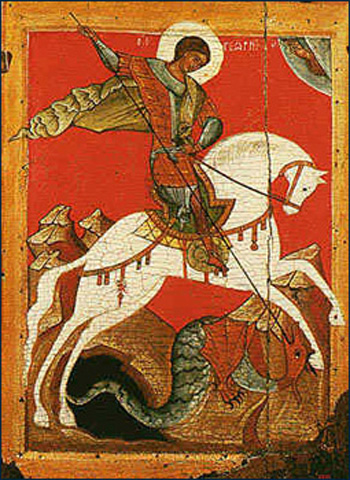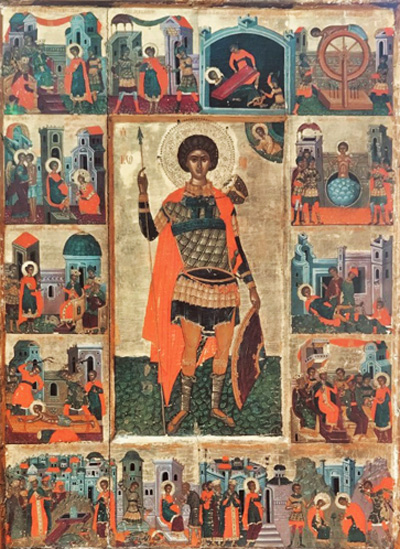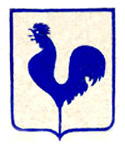Stories & Legends
 |
 |
 |
 |
 |
 |
 |
St. George Converts the Provost’s Wife
Now, this was the time after St. George had slain the Devil in the city of Silene in the province of Libya.
 At this time Diocletian and Maximian were Emperors, and under them there was such great persecution of Christians that within a month 22,000 were martyred. For this reason, some were so afraid that they denied God and sacrificed to the idols.
At this time Diocletian and Maximian were Emperors, and under them there was such great persecution of Christians that within a month 22,000 were martyred. For this reason, some were so afraid that they denied God and sacrificed to the idols.
Seeing this, St. George abandoned his knight's raiment, sold all that he had, gave it to the poor and put on the raiment of a Christian brother. He went into the midst of the pagans and began to cry, "The gods of the pagans and gentiles are devils. My God made the heavens and is the only God."
Then the provost, whose name was Dacian, said to him: "How can you say that our gods are devils? Tell us who you are."
He answered: "I am named George. I am a gentleman, a knight of Cappadocia, and I have left all in order to serve the God of Heaven."
The provost attempted with words to bring St. George to his faith, and failing to do so, had St. George beaten with iron rods until his body was broken in pieces, then sent to prison. Our Lord appeared to him that same night and comforted him sweetly.
Seeing that St. George would not surrender to his torments, the provost had his sorcerer prepare a powerful poison mixed with wine, which they gave to St. George. He took it, made the Sign of the Cross on it, and drank it. It did him no harm.
The sorcerer then made an even more powerful poison. St. George drank this as well, and it did him no harm. The sorcerer then knelt before St. George and begged him to make him a Christian. When the provost saw that his own sorcerer had converted to Christianity, he became furious ordered that his head be cut off.
The provost then commanded that St. George be taken and placed between two wheels mounted with swords; but the wheels broke, and St George remained unharmed. Then the provost had him thrown into a caldron filled with molten lead, but St. George sat there comfortably, as if he were in a warm bath.
At last the provost said to St. George: "Our gods are patient and forgiving. Abandon your folly and make sacrifices to our gods, and great honor will come to you."
St. George replied: "Why did you not say so earlier? I am ready to do as you request."
So the provost called all the people together to witness the conversion of his prisoner. St. George fell to his knees, but instead of worshipping the pagan gods, he called upon the Lord God of Heaven to destroy their temple and their idols.
 Immediately fire descended from Heaven, burning the temple, the idols and their priests. Then the earth opened and swallowed all the cinders and ashes that were left.
Then the provost was so angry that he said to his wife: "I shall die of anger if I cannot overcome this man."
Immediately fire descended from Heaven, burning the temple, the idols and their priests. Then the earth opened and swallowed all the cinders and ashes that were left.
Then the provost was so angry that he said to his wife: "I shall die of anger if I cannot overcome this man."
She replied: "Evil and cruel tyrant! Do you not see the great virtue of the Christian people? I told you that you should not do them any harm, for their God fights for them. Know well that I will become Christian."
Much abashed, the provost said to her: "You will be a Christian?" Then taking her by the hair, he beat her cruelly.
Then she asked St. George: "What will become of me? I have not yet been baptized."
He answered: "Doubt not, fair daughter, for you shall be baptized in your own blood."
She began to worship Our Lord Jesus Christ, then died and went to Heaven.
The next morning the provost had St. George beheaded. This was about the year of Our Lord 287. As the provost was returning homeward from the place where St. George was beheaded, fire fell down from heaven, consuming him and all his servants.



After St. George slayed the dragon,
he challenged the pagans
Seeing this, St. George abandoned his knight's raiment, sold all that he had, gave it to the poor and put on the raiment of a Christian brother. He went into the midst of the pagans and began to cry, "The gods of the pagans and gentiles are devils. My God made the heavens and is the only God."
Then the provost, whose name was Dacian, said to him: "How can you say that our gods are devils? Tell us who you are."
He answered: "I am named George. I am a gentleman, a knight of Cappadocia, and I have left all in order to serve the God of Heaven."
The provost attempted with words to bring St. George to his faith, and failing to do so, had St. George beaten with iron rods until his body was broken in pieces, then sent to prison. Our Lord appeared to him that same night and comforted him sweetly.
Seeing that St. George would not surrender to his torments, the provost had his sorcerer prepare a powerful poison mixed with wine, which they gave to St. George. He took it, made the Sign of the Cross on it, and drank it. It did him no harm.
The sorcerer then made an even more powerful poison. St. George drank this as well, and it did him no harm. The sorcerer then knelt before St. George and begged him to make him a Christian. When the provost saw that his own sorcerer had converted to Christianity, he became furious ordered that his head be cut off.
The provost then commanded that St. George be taken and placed between two wheels mounted with swords; but the wheels broke, and St George remained unharmed. Then the provost had him thrown into a caldron filled with molten lead, but St. George sat there comfortably, as if he were in a warm bath.
At last the provost said to St. George: "Our gods are patient and forgiving. Abandon your folly and make sacrifices to our gods, and great honor will come to you."
St. George replied: "Why did you not say so earlier? I am ready to do as you request."
So the provost called all the people together to witness the conversion of his prisoner. St. George fell to his knees, but instead of worshipping the pagan gods, he called upon the Lord God of Heaven to destroy their temple and their idols.

Scenes of St. George’s martyrdom
She replied: "Evil and cruel tyrant! Do you not see the great virtue of the Christian people? I told you that you should not do them any harm, for their God fights for them. Know well that I will become Christian."
Much abashed, the provost said to her: "You will be a Christian?" Then taking her by the hair, he beat her cruelly.
Then she asked St. George: "What will become of me? I have not yet been baptized."
He answered: "Doubt not, fair daughter, for you shall be baptized in your own blood."
She began to worship Our Lord Jesus Christ, then died and went to Heaven.
The next morning the provost had St. George beheaded. This was about the year of Our Lord 287. As the provost was returning homeward from the place where St. George was beheaded, fire fell down from heaven, consuming him and all his servants.

"The Legend of St. George," in Golden Legends,
compiled by Jacobus de Voragine,
First published in 1470. Trans. to English by William Caxton, 1st ed. 1483
Posted May 28 2022
compiled by Jacobus de Voragine,
First published in 1470. Trans. to English by William Caxton, 1st ed. 1483
Posted May 28 2022






